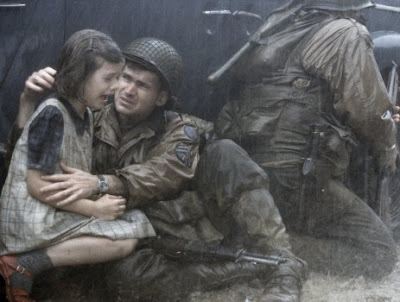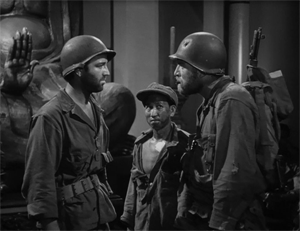"He got up on easy red beach,. and said 'there are only two types of men on this beach - those who are dead and those who are about to die, so let's get up off this beach and die inland' - and that officer I give my steel hat to any day."There's few genius auteurs who are legitimate tough guys, survivors of war, genuine witnesses of fucked up shit like liberating concentration camps and Warsaw ghetto uprisings and whatnot. I can only think of two offhand, and both are, interestingly enough, Jewish: Roman Polanski and Samuel Fuller.
This is isn't a post about Jewishness, but more of a reference to Fuller's auteur character's qualities, which are miles from the saintly self-righteous sheepishness of Spielberg's Jewish stand-ins in SAVING PRIVATE RYAN and SCHINDLER'S LIST. In short, the real survivors of war and oppression are free from having to depict anything but their firsthand observances, while those who come after can only nose amongst the wreckage and monuments like guilty bystanders. Fuller barely mentions his own Jewishness when addressing the horrors of the concentration camp he helped liberate - for him it's a crime against humanity... as a whole.
Think of RYAN for a minute, a film I used to love but is starting--with the passage of time--to seem ridiculous: Jeremy Davis hides in back in the rear during combat then runs up like the ghost of liberal pansy ass future, trying to stop Hanks from shooting prisoners and Ed Burns almost deserts because "this mission is FUBAR!" Dude, what mission wasn't FUBAR? Without getting shot on the spot. RYAN was the movie that made FUBAR a household name. Well my buddy John's bar was called FUBAR and it was destroyed by a falling crane, Mr. Spielberg! Look at this picture I have in my hands, Mr. Spielberg!
I actually admire Spielberg's directorial skill and desire to tell an important story, but we don't watch and love Spielberg's harrowing D-Day action set piece that opens RYAN for deep analysis of memory and observational detail, we love it for duplicating the sickening trauma of actually landing at Omaha; Fuller's is the trauma of remembering landing at Omaha, zig-zagging along Omaha beach, ducking machine gun fire and hopping over the corpses of bodies washing in and back out in the tide. Fuller didn't feel the need to 'duplicate' the experience in our minds, as much as record it. His war films, such as STEEL HELMET, FIXED BAYONETS and THE BIG RED ONE are chronicles of remembered anecdotes and observations. Like any good journalist he trusts these copious real details will be enough to garner the 'right' response from the audience: that war is more complex than mere conservative patriotism or liberal ashen dismay can encompass, that it is man at his best and worst all at the same time.
Then there's the issue of a character acting his biological age: these guys who died on the beach or survived were young and in Fuller's films they act their age: they talk trash while acting courageously, saintly in deed, foul in speech, not the reverse. And you see how survivors have battles have their trauma volume turned way down. You can see this in the voracious way Gene Evans devours a melon while debating whether to retrieve a set of dog tags from a fallen soldier in a minefield. That's how it has to be, if you are to survive, ala NIGHT OF THE LIVING DEAD, forgoing the dubious comfort funerals (and liberalist hand-wringing) can provide. You can imagine Spielberg deciding Evans is the bad soldier for not crying and pounding the sides of the foxhole when he realizes his buddy is dead, dead dead! Instead, Evans just lights another cigar, and finishes his melon. But it's only because he knows pounding the sides of the foxhole will only draw the attention of the enemy and is useless, and without that toughness survival is unlikely.
Fuller's actual war experience makes his spirituality move far beyond religions or borders, or even life and death. When Sgt. Zack (Evans) watches his young war orphan guide Short Round (Spielberg used the name for Indy's sidekick in TEMPLE OF DOOM in Fuller's honor) turning a Buddhist prayer wheel for example, you can feel Zack's respect for even this simple gesture, his awareness of the power that little motions like this can have--butterfly wing tsunami-style--in the greater scheme of war. In a situation where every movement might be your last, everything is imbued with profound significance, and in this the American soldier of Zack's integrity begins to understand how the Asian Buddhist mentality works.
But none of this is enough to make Zack 'break' in the emotional, manner of Spielberg's "The Mission is the Man" heart-bleeders. I think there is a lot of great moments of emotional group acting in RYAN, especially in the scene when they're gathered around the dying medic played by Giovanni Ribisi, and Tom Sizemore's character seems inspired a bit by Sgt. Zack, though the idea of lugging around 'dirt' from different countries in an already heavy pack seems like something made up by a screenwriter.
For Fuller, though, humanity outflanks mere respect for each others' differences - especially around the varied reactions to the Buddha statue in the temple where the second half of the film plays out. Though eventually when Zack jumps on the the statue and uses at as cover during the climactic firefight, you realize that when push comes to shove, it's just a statue. That's the difference, again, between Spielberg's queasy sentiment and Fuller's iron-clad compassion.
I love the casual way these guys bump into each other, light matches off each others' helmets, using them as hand railings when climbing over each other like a litter of puppies, sticking cigars in each others' mouths, guiding their progress with hands on their chests, saying cool stuff like "I'd be crossing the army if I brought you luck." - a whole code of issues about the best jobs to have and various companies are seamlessly integrated into daily talk. I noticed this when having lunch with a bunch of rangers headed for Iraq about five years ago. Their favorite word was 'jihad' - "I'm putting a jihad on this waiter if she doesn't bring us more coffee" -- Zack has that same hard-won, hard-bit sense of humor too, as with his insistence on the splendor of infantry life. When a soldier in his ragtag outfit complains, "when I get out I'm gonna join the air force, no more beetle-crushing for me." Evans replies "in war there's nothing like infantry. You get hit and, dead or alive, at least you're on the ground." It's a good point that indicates knowledge of countless stories of drifting at sea on life rafts for weeks, or getting eaten by sharks, or burning to death in a plummeting B-17. To a soldier for whom every minute of life is a grace (the hole in his helmet a reminder he should be, and maybe is, already dead), the presence of the ground beneath his feet is a constant reassuring miracle.
In war normal boundaries are dissolved and boundaries between soldiers seems (in Fuller's films at least) the first thing to go, as when Zak comes tumbling into a ravine with a bunch of pinned down soldiers, all clumsy and awkward, then pops up completely relaxed, like a love-in version of a mosh pit. The one bow to Christianity is the mock-solemn way Evans examines and blesses his crew, Short Round particularly, finally tapping their helmet in the third eye, like a benediction. This kind of hands-on camaraderie creates intimacy without weakness. Like a good 70s dad, Evans creates the space for the others to enjoy and relax; he takes pride in making some sense of safety possible, without bothering to participate in it directly. His natural grumpiness serves him well. His love is tough, and if it wasn't, he and his charges would already be long dead.
As Fuller notes in his autobiography, producers first wanted John Wayne and then Larry Parks for the Sgt. Zack role, with Fuller threatening to quit each time (Evans was a combat engineer in WW2). A decorated war veteran, Fuller even had business meetings with the army brass over elements like Zack shooting a Korean prisoner of war, shooting up a Buddha statue, and mentioning Jim Crow and Japanese internment camps in the soldier's dialogue. The North Korean officer they caught even has an American accent, and bad teeth. And Fuller fought his way through to having it all included.
Never try and fight with a veteran! No 20th Century Fox mogul can ever hope to be scary to a guy like Fuller unless he's got a fleet of Panzers or German 88 artillery. The end result of it all was worth the fight; there are things here about war you will learn nowhere else. Evans' relative anonymity helps his Sgt. Zack character resonate as 'real'- as does his no nonsense authentic veteran movements. Neither Evans nor Fuller needed military experts to tell them how it really was, and if, after all that gritty authenticity, Evans still emerges as a hero it's an honor due not just our medal-winners but every survivor of war.
At the end of RYAN, Matt Damon's elderly grandfather asks his wife "am I a good man?" While I never fail to cry at that moment, I still think it's not a question Sgt. Zack would ever ask himself. War is not a place where dying for a friend requires a pre-agreement to 'earn it.' War is just a fucking bloody mess, and the idea of 'earning it' implies a core sanity or rightness which is the death of true courage.























0 коментарі:
Дописати коментар